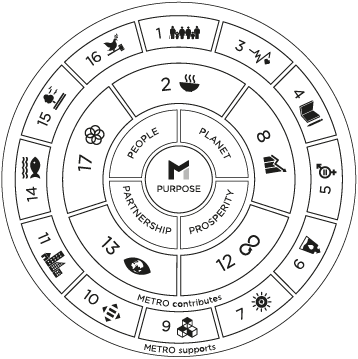METRO SUSTAINABLE
Our society faces unprecedented economic, environmental, social and cultural challenges. We are convinced that sustainability is the key to transforming these challenges into opportunities.
As a partner to independent business owners along the entire value chain, we do more for business-passionate people – in a responsible way. This reflects the core of our business and our sustainability approach METRO SUSTAINABLE.
Since our focus is on the food sector, this means improving our ‘foodprint’ while minimising our footprint. In concrete terms, this means: We strive to positively impact the availability, consistency, health and social and environmental safety of food, prevent food waste and make our product and service offerings more sustainable overall, as well as to provide efficient solutions to simplify our customers’ business activities. At the same time, we want to minimise our environmental and social footprint by responsibly managing people and resources and creating a positive impact on society overall.
It is our vision to make retail more sustainable along the value chain in our work with small and medium-sized independent suppliers and customers and in contact with consumers. By reconciling our needs and goals with the needs of nature, people and future generations, we can act responsibly, remain successful in the long term and overcome the conventional limits of growth. Through information, inspiration, motivation and support of our employees, customers and partners, this visionary approach has the potential to reach millions of people.
METRO SUSTAINABLE – Our contribution to sustainable development

- Further information on METRO SUSTAINABLE can be found online at www.metroag.de/cr-report-2017-18.
The guiding principles for us are the United Nations Sustainable Development Goals (SDGs). These goals also form the global action framework for our corporate strategy, which is shaped by the principle of sustainability. Inspired by the SDGs, we have refined our sustainability approach. With our areas of responsibility (Empower) People, (Secure) Planet, (Unfold) Prosperity and (Enhance) Partnerships, we support the SDGs, in particular the goals in which we are most directly involved: 2 (Zero Hunger), 8 (Decent Work and Economic Growth), 12 (Responsible Consumption and Production), 13 (Climate Action) and 17 (Partnerships for the Goals). Through the diversity of our activities and the interdependence between these projects and the SDGs, we contribute to the 17 goals of the global agenda with our commitment to sustainability. As a member of the UN Global Compact, we also incorporate the 10 principles of the UNGC into our work, strategy and corporate culture.
By taking these international initiatives into account, we highlight our actions as a responsible, global and locally active company. We consider ourselves to be a value-creating part of society and we contribute to achieving sustainable economic, social and environmental development.
To ensure that our sustainability approach addresses the aspects and issues that most affect our business and that we can leverage through our business activities, we conducted another materiality analysis in the course of financial year 2017/18 in accordance with the requirements of the CSR Directive Implementation Act. Assessment of the facts was based on the legally required materiality definition. The aspects and issues identified in the analysis are the content of this NFS and comply with the requirements of the CSR Directive Implementation Act for the reporting of non-financial content. In addition, we were able to use our sustainable value creation model, a method of sustainability accounting, for the first time to quantify the economic, environmental and social effects of our business activities along the value chain in monetary terms. The results are also reflected in the NFS.